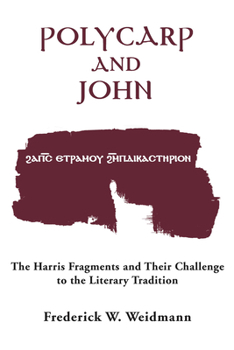Polycarp and John: The Harris Fragments and Their Challenge to the Literary Traditions
(Part of the Christianity and Judaism in Antiquity Series)
Select Format
Select Condition 
Book Overview
A multifaceted work exploring an important and little-known text on Polycarp of Smyrna, Bishop and martyr, and his association with the apostle John.
The text of the Harris Fragments on Polycarp and John raises anew exciting questions about martyrdom and apostolicity, the earliest history of the important Christian communities at Ephesus and Smyrna, and the legacies of Polycarp and John among early Christians. This ancient work includes significant portions of narrative description and dialogue which are preserved nowhere else among extant texts and shows significant similarities to the earliest strata of other important early Christian works such as the Acts of John and the Martyrdom of Polycarp.
In Polycarp and John: The Harris Fragments and Their Challenge to the Literary Traditions, Frederick W. Weidmann presents an authoritative critical edition and translation of the Harris Fragments on Polycarp and John. Coptologists and philologists are well-served through extensive text-critical notes, while a broader range of interested readers will appreciate, and benefit from, the register of parallels to the New Testament and other ancient literature, and the informative introduction to the ancient text.
An essay on the narrative strategy of the text identifies the broad theme of the work, "apostolicity and martyrdom," as well as many of the rhetorical motifs and elements employed. The Commentary, a significant work in itself, provides a wealth of information about possible biblical sources and parallels, as well as consideration of pertinent Jewish, pagan, and other early Christian works. Weidmann suggests and pursues several relevant avenues of inquiry in order to illuminate the words, phrases, and episodes which make up the extant text, and to engage the cultural context, social location, and theological proclivities of the community in and for which the work may have been written.





